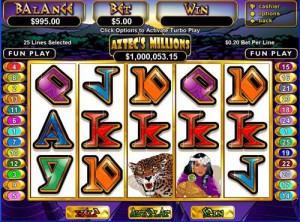After The Jackpot Slot Games
The dream of every slot player—winning a life-changing jackpot—can turn into a financial nightmare if you don’t manage your money properly. Here are some tips to prepare you for hitting the big one.
By Ted Oglesby
In the October issue of Strictly Slots, Bill Burton wrote a very interesting article about how easy it can be to lose “found money”—particularly when it comes to people who win huge casino jackpots, only to squander their fortune due to poor financial decisions. He quoted a study that showed many people over the years who have won moderate to massive sums find themselves with nothing, or in bankruptcy, within five years.
Away from the casino, “found money” can also come in the form of inheritances (tax free to recipients), lottery winnings that can reach several hundred million dollars, the Publisher’s Clearing House top prize, etc. Within five years, far too many of these people are in deep trouble with IRS and/or bankrupt. Simply put, too many winners simply don’t know all the factors that must be considered, and the steps that should be taken. Forgetting even one can spell financial doom.
As a tax professional and financial planner, as well as a successful slot player since 1986, I have counseled many clients over the years and represented some before the IRS. So let me counsel you (free of charge) about the ramifications of suddenly receiving of a sizeable sum. The largest number of ramifications involve the taxman—but there are ways to eliminate, and even profit, from them.
First of all, casino winnings are, of course, taxable. Casinos must issue a W-2G on every win beginning at $1,200. The IRS and the states know you have it, and want their share. Some casinos require you to withhold taxes, particularly on the larger sums. The usual is at least 20 percent. Some let you opt out of withholding—but don’t take this option. A $1 million-plus win puts you in the top tax bracket (at this time, that means 35% goes to taxes, and may go to 39%). You’ll have some losses you can deduct against your win, so have 30+ percent withheld plus whatever your state rate may be. Simply staying out of trouble with the IRS can save most big winners. Your coin-in totals on your slot cards is proof of investment.
Most lotteries require withholding of federal and state taxes. Some require only 20 percent. Let Uncle Sam withhold his full share. If you withhold only the minimum required, put the remainder that will be due into a CD which will mature before the tax deadline.
Though inherited money is tax free to recipients, the giver paid the taxes if the amount was more than the exclusion amount. You should consult a financial advisor about how to profitably invest this money. If he counsels you well, this fee is money well spent, and is itself deductible.
Many of the jackpot winners you see in the pages of this magazine say they’re going to buy a house with their windfall, help their children out, or buy a car, etc. If you’re buying a house for your son, you’ll be better off selling it to him with a $13,000 down payment as a gift and then self-finance the balance. Each year, give him another $13,000 until the house is paid off. While that $13,000 gift is non-taxable to him, you’ll have to pay a gift tax on any amount over that at a pretty high rate. If you buy a car for him that costs more than $13,000, do it the same way.
If he’s married, you can give him and his spouse $13,000 for a total of $26,000. If you are married also, you and your spouse each can give them $26,000 for a total of $52,000 a year. The law is that each person can give that $13,000 maximum to as many people as they wish each year.
If you win a mega lottery in the multi-millions, there are a number of things you need to consider besides the income taxes you’ll owe. Your age is one factor to take into account. Your estate will owe estate taxes over the exemption amount, and they can be much higher than the highest income tax bracket. It might be better to give it to your heirs, year by year, as explained above. In addition, you could hire them to help research or manage segments of your portfolio. You’d have to pay payroll taxes and they’d have to pay taxes on that income, but it would be at a much smaller overall rate than the estate tax. Each year, you could sell securities that are showing a loss to an amount equal to $3,000 plus all securities or properties you sold at loss. These will offset any capital gains you may have, thus making them tax-free. Capital losses exceeding capital gains can be carried forward indefinitely.
I suggest you write down a basic plan of what you will do should you “find” this type of money. Personally, I have a written plan which can be adjusted depending on the size of the jackpots I might win. I know the first 10 percent and more is going to my church. There are other non-profit charities I support. In short, my plan gives the biggest share of my windfall to charity. That reduces my federal and state income taxes. Taxes most likely will follow charity as the next largest category. I get what’s left, and I won’t start deciding how to spend it until those other obligations are met.
A little bit of advance planning can save you a lot of headaches—and a ton of money—should you ever hit the big one. Get started now!
For numerous tax-saving and income-increasing strategies in many areas, write to Ted Oglesby at P.O. Box 663, Gainesville, Ga. 30503.
After The Jackpot Slot Games.



